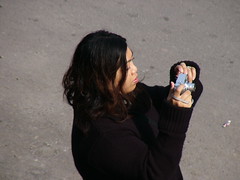Which brings me to my next question -- what are our rights to photograph? Here in the U.S., I'm in a minority camp as far as I can tell. I participate and read discussions in Flickr about the right to photograph something or somebody -- accidents, people, situations -- and whether an image in the public eye is within one's rights to capture. Compared to the rest, I'm not aggressive enough. Maybe I'm too shy, maybe I don't think the need to photograph exceeds general courtesy where people are concerned. I commented in a forum about a photograph someone took of an accident. There was nothing particularly artistic about this photo, and he said both drivers looked fine -- it was just a fender bender. I said there didn't seem to be any purpose served in posting such a photograph, since it was just a picture of two bunged-up cars. I suggested that he might take it to the local police station to see if it would prove useful in an accident report, then David informed me that photographs are not admissible as evidence in court any more. (Later in that thread someone dug up a report stating NO recorded image or data is admissible, including audio.)
Counter to my idea of intent determining the action of taking and posting a photograph, the other arguments in this discussion centre around the idea that you can take photographs of whatever is public. It's all fair game. There are many instances of people harrassed by authorities for taking photographs of such things as bridges after 9/11, and for that I agree we've given up too much freedom for the sake of
I realise there's a huge grey area for photography in terms of privacy, responsibility, and what constitutes the public domain. But I don't know sometimes if I'm concerned with respecting people's privacy or inadvertently acknowledging a level of paranoia heightened by media. (What makes the news? Shootings, sex crimes, stalkings, voyeurism, break-ins... it's a wonder people get the nerve to leave the house after watching the news. We are BOMBARDED with negative imagery every single day!)
I will admit I have taken photos of people covertly, such as people looking at art at MoMA in New York, usually with their backs are turned, but I don't make a practice of it. I'm very reluctant to take candid photographs of children unless I get their parents' attention first and get some sort of confirmation that it's OK for me to photograph them. I'm not posting to Flickr photographs of my own nieces and nephews in the bath, and I'm thinking of even pulling all the kids' photos off Flickr and this website, or making them available to family only in Flickr, just to cover myself. Is this extreme? I don't know -- I find this country rather extreme at times, so maybe I'm just acclimatising.
In a couple of the threads I mentioned, someone posted a URL to a guide called "The Photographer's Right", by Bert P. Krages II, Attorney at Law.
Your Rights When Stopped or Confronted for Photography
On the page is a link to a downloadable guide in PDF format that is loosely based on the ACLU's Bust Card and the Know Your Rights flyer, which is worth having a look at and printing for future reference. I don't know what the equivalent would be for Canada, but there's a link to a UK guide on that site.
As far as the guide's pertinence to me, I'm less of a street photographer than a still life photographer, but I imagine my inclinations will change over time, and involve more people than inanimate objects. I've been reading about bans on public transit such as the New York subway with much interest. I perhaps don't exercise my rights to the fullest extent of the law -- if someone tells me not to photograph, I don't even question it. My ambivalence towards the weight and balance of rights versus personal ethics will no doubt codify the more photos I take of people in broader contexts.

